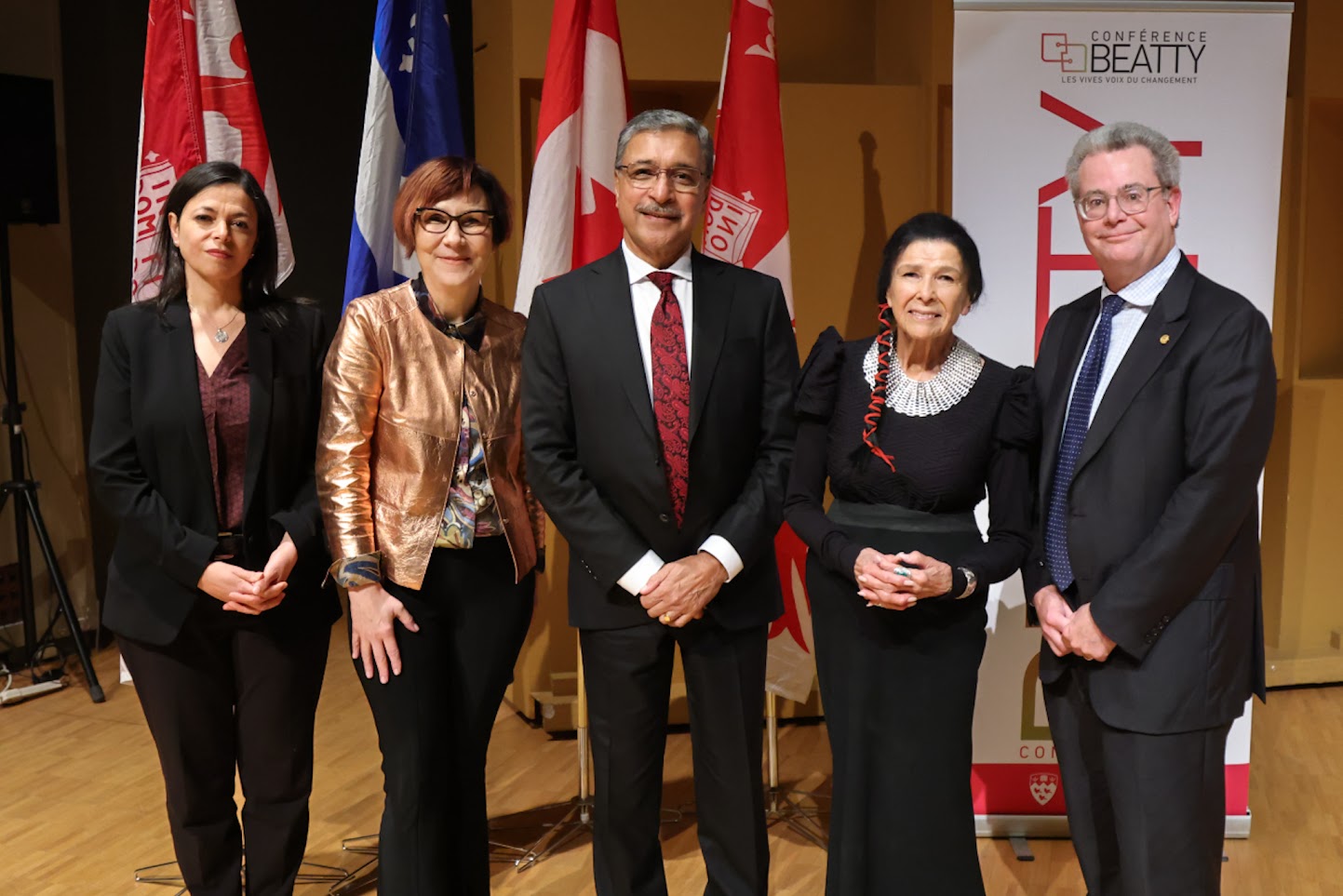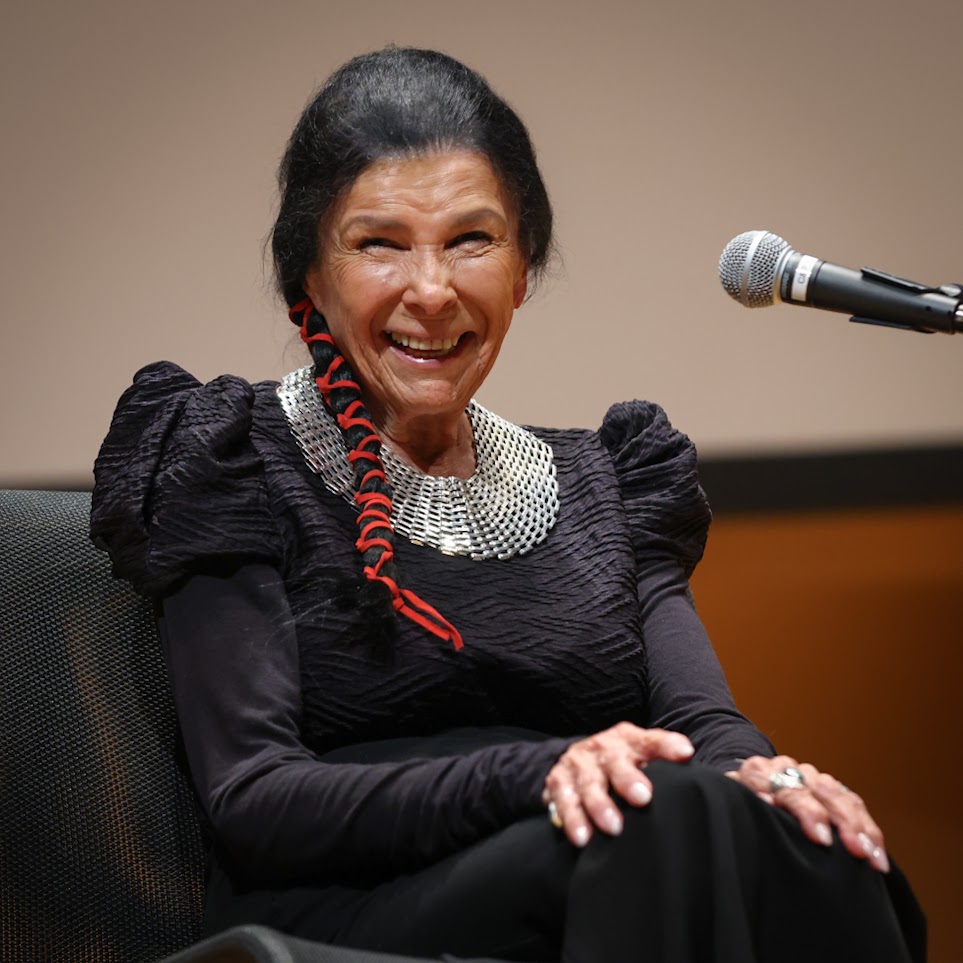
Acclaimed Indigenous filmmaker Alanis Obomsawin presented this year’s Beatty Lecture at McGill’s Pollack Hall. Hundreds attended the sold-out event on October 16, with tens of thousands more likely to listen to the broadcast version on CBC Radio’s Ideas in November.
The McGill event began with a welcome by the host of Ideas, Nahlah Ayed, and one by Principal Deep Saini. In introducing Obomsawin, Cindy Blackstock, a professor at the School of Social Work and recent winner of the World’s Children Prize, praised her talents as singer-songwriter, visual artist, and filmmaker. Blackstock spoke of Obomsawin’s gift for using silence as a canvas, particularly as a filmmaker.
“She uses her own silence to privilege the voices of First Nations, Metis, Innuit, and other peoples in her filmmaking at the National Film Board. She uses silence as a way of learning, as a way of example for all of us,” said Blackstock.
Sacred life
Through the Beatty Lecture, Obomsawin, a member of the Abenaki nation, stepped out of her listening role, sharing stories from her early life on the Odanak First Nations reserve, to the racism she endured going to school in Trois-Rivières.
“Abenaki: people from where the sun rises. [They] lived by the Atlantic Ocean and believed they were the grandparents of other nations because they were the first to receive the light of the sun rising over the sea. This was the east, where life begins.”
Obomsawin addressed the impacts of residential schools and neglect by those who should have cared. She recounted how a doctor was willing to abandon her as sick child, while her mother’s aunt refused to let her die.
“She took out a blanket, wrapped me in it, and took me away. She kept me for six months. No one knows what she did. She saved my life.”
Moving from darkness to light, Obomsawin brought her audience to a place of hope.
“My dear brothers, and my dear sisters, your life is sacred. When times are hard, take a deep breath. Concentrate on bringing love into your heart. Hold that love in your heart and soon you will want to share the good feelings with others.”
Listen and observe

Obomsawin spoke at length about her love for documentary making. She also dove into specific projects like her internationally acclaimed 1993 film Kanehsatake: 270 Years of Resistance, about the so-called Oka Crisis. She explained how listening and observation allowed her to “witness the spirit of courage [of] the people who were part of the resistance.”
She wrapped up her lecture praising institutions that make and share documentary films, which she described as “filling the void with the sounds of all people.”
The evening closed with Obomsawin taking questions from Ayed and the audience, including one from a McGill student looking to deepen her filmmaking approach.
“Just hear, just listen. That will help you figure out how to make your film because, if you’re listening, you’ll receive images through what a person is talking about. It’s a very enriching way of doing things,” counselled Obomsawin.
She also responded to questions about Canada’s legacy of harm to Indigenous peoples and the path towards reconciliation.
“I know that, in general, Canadians want to see justice for our people. […] My greatest wish has come true. Today, everything is possible for this generation and future generations,” she said.
Mobilizing Indigenous voices
McGill Provost and Vice-Principal (Academic), Christopher Manfredi, closed the event with words of thanks and praise for Obomsawin.
“Throughout your remarkable carrier, your dedication to education, music, documentary cinema, and activism, you have mobilized Indigenous voices and ideas to transform society,” he said. “You’ve made a difference in how people – Indigenous and non-indigenous – understand ourselves and our relationships to each other. Thank you for your work and thank you for sharing it with us.”
The Beatty Lecture is organized by McGill’s Research and Innovation, in collaboration with University Advancement, and this year, with the Office of Indigenous Initiatives.

What an interesting woman. Listening intently has brought her where she is today. Maybe more of us should take heed and do likewise. Observation IS listening.